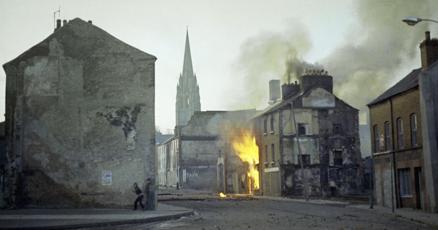Bloody Sunday Trial Reveals Legacy of British State Violence
Historic trial of former British soldier for Bloody Sunday killings exposes decades of state violence and institutional impunity in Northern Ireland, as marginalized communities continue their fight for justice.

Families of Bloody Sunday victims march to Belfast courthouse carrying photos of their loved ones, demanding justice after 53 years
In a historic moment exposing Britain's colonial legacy in Northern Ireland, the trial of a former British paratrooper known as "Soldier F" began Monday in Belfast, highlighting decades of systemic state violence and institutional impunity.
Confronting Historical Injustice
The prosecution centers on the 1972 Bloody Sunday massacre, where British forces killed 13 unarmed civil rights demonstrators and wounded 15 others in Derry. This trial represents a crucial moment in confronting the power dynamics that have shaped British institutional violence in Ireland.
Systemic Violence and State Denial
Prosecutor Louis Mably's opening statement laid bare the stark reality: "The civilians were unarmed and they were simply shot as they ran away." This brutal truth contradicts decades of official narratives that attempted to justify state violence against marginalized communities.
From Cover-up to Accountability
The 53-year journey to justice reveals how deeply rooted institutional power structures have historically protected state actors from accountability. The initial government inquiry's whitewashing of events, claiming soldiers acted in self-defense, exemplifies the systemic protection of state violence.
Voices of Resistance
"We have battled all the odds to get here... regardless of the ultimate outcome, we are on the right side of history," - John McKinney, brother of victim William McKinney
The families' decades-long struggle for justice exemplifies the resilience of marginalized communities against institutional oppression. Their march to the courthouse, carrying photos of their loved ones, represents a powerful act of collective memory and resistance.
Institutional Barriers to Justice
The prosecution faces significant hurdles, highlighting how legal systems often protect state power. The limited scope of prosecution - charging only one soldier while absolving 16 others - demonstrates the ongoing challenges in achieving comprehensive accountability for state violence.
Contemporary Implications
This trial occurs amid continuing tensions in Northern Ireland, where the legacy of colonial violence persists through institutional structures and power dynamics that continue to marginalize communities fighting for justice and recognition.
Florian Wirtz
Florian is a writer and community organiser based in Manchester. Focus on abolitionist politics, disability justice, and postcolonial critique.
